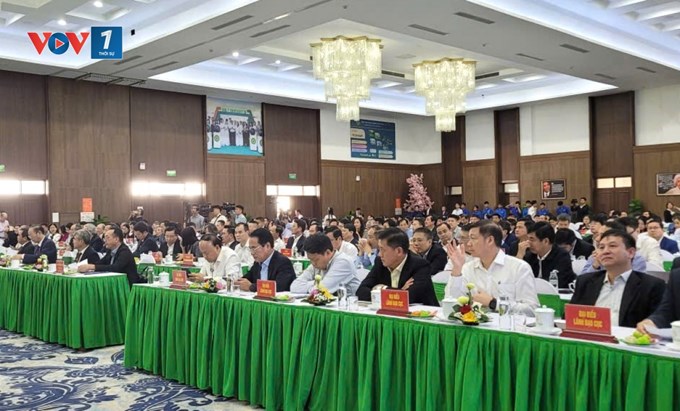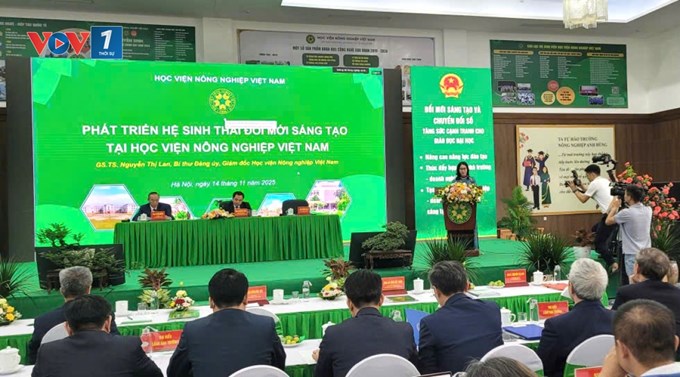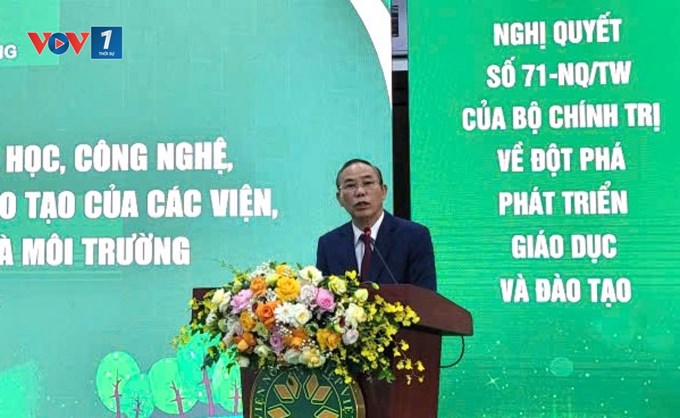Promoting breakthroughs in scientific and technological research and innovation in association with training activities at institutes and universities under the Ministry of Agriculture and Environment, in accordance with Resolution No. 57.
To implement Resolution No. 57 of the Politburo on breakthroughs in science and technology, innovation, and national digital transformation, on the afternoon of November 14, 2025 in Hanoi, the Ministry of Agriculture and Environment organized an “Online conference on Promoting breakthroughs in scientific and technological research, innovation, and training at institutions affiliated to the Ministry”.
Focusing on assessing the current situation and research capacity of research institutes and universities under the Ministry, delegates proposed solutions to enhance technology transfer, strengthen international cooperation, and accelerate the application of scientific and technological achievements in agricultural production and natural resources–environment management.

Delegates attending the conference
According to Prof. Dr. Nguyen Thi Lan, President of Vietnam National University of Agriculture (VNUA), many scientific research models at universities worldwide demonstrated that the strength of an innovation-driven knowledge ecosystem could become the most powerful societal resource. A strong innovation ecosystem could shorten the gap between research and the market, facilitate the emergence of enterprises, nurture students’ entrepreneurial spirit, attract social resources, and enhance institutional reputation. Prof. Dr. Nguyen Thi Lan added that “VNUA has promoted research activities with an innovation-driven mindset. Various breakthrough mechanisms related to income, research commissioning, and topic orientation have created significant momentum. Many technologies and technological processes have been transferred and commercialized, generating tangible benefits for enterprises and farmers. Alongside these achievements, the university also possesses a substantial intellectual asset, many products with high commercialization potential that require a more enabling environment and breakthrough policies to enter the market more rapidly and effectively.”

Prof. Dr. Nguyen Thi Lan emphasizes the need for a more enabling environment and breakthrough mechanisms to advance research and the transfer of scientific and technological innovations in the agricultural sector.
Several opinions suggested the need to clarify incentives that would encourage scientists and enterprises to engage in research and collaborate with institutes and universities. Drawing from practical experience, Mr. Trinh The Truong, Chairman of the Board of Directors of Bac Hung Hai Irrigation Works Exploitation One-Member Co., Ltd., noted that the Bac Hung Hai irrigation system was structurally complex and spanned across multiple localities, including Hanoi, Hung Yen, Bac Ninh, and Hai Duong provinces (before their administrative merger). Under the impacts of climate change and structural economic shifts in the region after adopting the two-tier governmental model, the application of science and technology, digital transformation, and innovation in system management and operation became critically important. Recognizing this need, the company had, in recent years, conducted research and installed automatic monitoring devices such as water-level gauges, rainfall meters, and salinity sensors, while monitoring operations across the system. They had also developed hydrological and mapping databases using Google Maps and introduced remote operation of facilities.
Mr. Trinh The Truong stated that“The adoption of these solutions has enabled the company to more effectively respond to changes in system conditions. Specifically, it has helped mitigate water shortages and salinity intrusion. Continuous monitoring has supported more accurate operational decisions and maximized water intake into the system, contributing to drought mitigation and reduced pollution.”
At the conference, Deputy Minister of Agriculture and Environment Phung Duc Tien emphasized the need for institutes and universities to shift their mindset, enhance human-resource quality, and develop training models aligned with practical needs and market demands. These would serve as foundations for the creation of breakthrough scientific and technological products that would make substantive contributions to green growth, circular economy development, and digital transformation in the sector. He stressed that research proposals had to originate from real production demands and provide technological solutions. Priority should be given to breakthrough fields with strong development potential, such as biotechnology, to create advances in agricultural seed resources, production processes, processing and preservation, efficient mineral resource utilization, and environmental protection.
Deputy Minister Phung Duc Tien emphasized that “It is important to support and promote effective cooperation models among the ‘three stakeholders’, including the State, academia, and enterprises, especially focusing on the engagement of enterprises from the initial stages of research commissioning, implementation, and technology transfer to production and commercialization. Special attention must be paid to developing a high-quality, skilled workforce capable of mastering advanced technologies. We encourage the participation of domestic experts, highly skilled overseas Vietnamese, and experts from the business sector to collaboratively implement the Ministry’s resolutions and plans on scientific research.”

Deputy Minister Phung Duc Tien calls for renewed thinking in scientific and technological research among institutes and universities
At the conference, delegates also shared solutions to accelerate technology commercialization and practical technology transfer, affirming that digital transformation represented a new driving force for breakthroughs in science and technology.